Understanding The Power of Mindset: What is a Mindset & Why Does it Matter?
- BrainTap App, BrainTap Sessions, Education, Health and Wellness, Mindfulness and Meditation, The BrainTap Headset
Share this post on social media


 In the grand theater of life, our mindset assumes the pivotal role of the director, shaping the narrative, setting the tone, and guiding the characters through their journeys. It’s the silent force that influences every decision, every action, and ultimately, the outcome. But what exactly is this enigmatic power called “mindset,” and why does it matter?
In the grand theater of life, our mindset assumes the pivotal role of the director, shaping the narrative, setting the tone, and guiding the characters through their journeys. It’s the silent force that influences every decision, every action, and ultimately, the outcome. But what exactly is this enigmatic power called “mindset,” and why does it matter?
Mindset is more than just a fleeting thought or belief; it’s the lens through which we view the world. It’s the filter that colors our experiences and determines our responses to challenges and opportunities. It’s the difference between seeing an obstacle as an insurmountable wall or a stepping stone on the path to growth.
Fixed Mindset vs. Growth Mindset
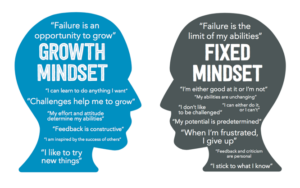
Our mindset can be classified into two primary categories: the fixed mindset and the growth mindset. A fixed mindset sees abilities and intelligence as static traits, etched in stone from birth. In contrast, a growth mindset views these attributes as dynamic, capable of expansion through effort, learning, and resilience.
Think of the fixed mindset as a stagnant pool, hesitant to adapt or change. It shies away from challenges, fearing that failure will validate its perceived limitations. On the flip side, the growth mindset resembles a flowing river, eagerly embracing challenges as opportunities for growth and personal development.
What makes mindset even more intriguing is that it isn’t just a philosophical concept; it’s grounded in science. Our brains, marvels of adaptability, are in a constant state of transformation based on our thoughts and experiences. This phenomenon, known as neuroplasticity, underscores the notion that our mindset can physically mold our brain’s structure and function.
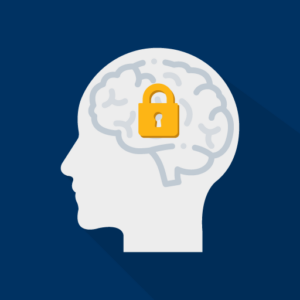 Mindset extends its influence far beyond mere cognitive patterns. It exerts a profound impact on our overall wellbeing. A growth-oriented mindset correlates with reduced stress levels, improved mental health, and a more fulfilling life. But perhaps most compellingly, it is an undeniable predictor of success. Those who firmly believe in their capacity to grow are more likely to overcome obstacles and achieve their goals.
Mindset extends its influence far beyond mere cognitive patterns. It exerts a profound impact on our overall wellbeing. A growth-oriented mindset correlates with reduced stress levels, improved mental health, and a more fulfilling life. But perhaps most compellingly, it is an undeniable predictor of success. Those who firmly believe in their capacity to grow are more likely to overcome obstacles and achieve their goals.
In this extensive exploration of the power of mindset, we delve deeper into the definitions, types, and profound influence it wields over our lives. We peel back the layers of scientific understanding that validate its significance. And, most importantly, we provide practical steps and insights to help you cultivate a growth-oriented mindset.
Join us in this quest to understand the very essence of mindset and discover why it matters more than you might ever have imagined.
Mindset, in its essence, is the lens through which we perceive and interact with the world around us. It’s the cognitive filter that shapes our thoughts, beliefs, and responses to life’s myriad experiences. But to truly understand the power of mindset, we must first define it and explore its foundational principles.
At its core, mindset represents a set of deeply ingrained attitudes and beliefs that influence our interpretation of reality. Imagine it as the pair of glasses through which we view the world, determining whether we see opportunities or obstacles, growth or stagnation, success or failure.

The concept of mindset has its roots in the field of psychology, where it was first introduced by psychologist Carol Dweck. Dweck’s groundbreaking work in the late 20th century shed light on the pivotal role mindset plays in shaping human behavior and achievement. Since then, it has become a pivotal subject of study, revealing its profound impact on various aspects of life.
Our mindset serves as the curator of our mental landscape. It affects how we perceive challenges, setbacks, and opportunities. With a growth mindset, we see challenges as opportunities to learn and grow. In contrast, a fixed mindset tends to perceive challenges as threats to our abilities.
Furthermore, mindset plays a significant role in our behaviors and actions. It dictates whether we embrace challenges with resilience or retreat from them in fear. It determines whether we pursue self-improvement or settle for the status quo.
While the most commonly discussed mindsets are the fixed mindset and the growth mindset, it’s crucial to recognize that mindset exists along a spectrum. At any given moment, our mindset may lean more toward fixed or growth, influenced by our beliefs, experiences, and emotions.
In essence, mindset is not a fixed trait; it’s malleable. We have the capacity to shift and reshape our mindset, opening the door to personal growth and transformative change. This very capacity is what makes understanding mindset a powerful tool for personal development.
As we delve deeper into the exploration of mindset, we’ll move beyond mere definitions and venture into the fascinating world of the different types of mindsets. In the following sections, we’ll uncover the fixed mindset’s limitations and the boundless possibilities of the growth mindset. Together, we’ll embark on a journey to harness the power of mindset for a more fulfilling and successful life.
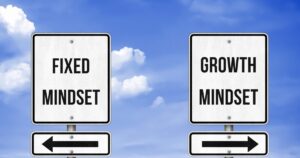 Mindsets are not one-size-fits-all; they come in various forms, each with its distinct characteristics and impact on our lives. In this section, we’ll delve into the two primary types of mindsets: the fixed mindset and the growth mindset.
Mindsets are not one-size-fits-all; they come in various forms, each with its distinct characteristics and impact on our lives. In this section, we’ll delve into the two primary types of mindsets: the fixed mindset and the growth mindset.
A fixed mindset is characterized by the belief that abilities and intelligence are static traits. Individuals with a fixed mindset often avoid challenges to maintain a sense of competence. Failure is viewed as a reflection of inherent limitations, leading to a fear of making mistakes.
The fixed mindset can limit personal and professional growth, as it discourages taking risks and embracing new experiences. It fosters a preference for staying in one’s comfort zone rather than pursuing opportunities for learning and development.
Individuals with a fixed mindset may become discouraged in the face of setbacks and may give up on challenging goals.
A student who believes that their intelligence is fixed may avoid taking on challenging courses for fear of receiving a lower grade.
An employee with a fixed mindset may resist taking on new responsibilities at work to avoid the possibility of failure.
A growth mindset is characterized by the belief that abilities and intelligence can be developed through effort, learning, and perseverance.
Individuals with a growth mindset embrace challenges as opportunities for personal growth and improvement.
Failure is seen as a natural part of the learning process, and setbacks are viewed as opportunities to learn and adapt.
The growth mindset fosters resilience in the face of challenges, as individuals believe in their capacity to improve over time. It encourages a passion for learning and a willingness to take on new challenges and experiences.
Individuals with a growth mindset tend to have a more positive outlook on life and a greater sense of self-efficacy.
A student with a growth mindset approaches difficult subjects with enthusiasm, knowing that effort and learning will lead to improvement.
An entrepreneur with a growth mindset views setbacks as valuable learning experiences and persists in pursuing their goals.
It’s important to note that mindsets exist along a spectrum, and individuals may exhibit characteristics of both fixed and growth mindsets in different situations. Understanding this spectrum allows us to recognize that mindset is not a fixed trait; it can be cultivated and developed.
As we explore the power of mindset further, we’ll delve into the practical implications of these mindsets in our lives. We’ll discover how a growth mindset can lead to personal and professional success and how to transition from a fixed mindset to a growth-oriented perspective.
The fixed mindset is a lens through which individuals perceive their abilities and intelligence as static, innate traits. In this section, we’ll delve deeper into the characteristics, impact, and limitations of a fixed mindset.
Characteristics of a Fixed Mindset:
Fear of Failure: Individuals with a fixed mindset often fear failure as it is seen as a confirmation of their inherent limitations. This fear can lead to risk aversion and a reluctance to take on challenges.
Avoidance of Challenges: To maintain a sense of competence, those with a fixed mindset may avoid situations that could potentially expose their shortcomings. This avoidance can hinder personal and professional growth.
Belief in Fixed Intelligence: In a fixed mindset, intelligence is perceived as a fixed trait, and the belief is that one either has it or doesn’t. This belief can limit the pursuit of new knowledge and skills.
The fixed mindset imposes significant limitations on individuals’ lives:
Stagnation: Individuals may remain stagnant in their comfort zones, avoiding opportunities for growth and development.
Lack of Resilience: When faced with setbacks or failures, those with a fixed mindset may become discouraged and give up easily.
Underachievement: The fear of making mistakes or failing to meet high expectations can lead to underachievement and missed opportunities.
Academic Performance: A student with a fixed mindset may avoid enrolling in challenging courses because they fear receiving a lower grade and the associated blow to their self-esteem.
Professional Growth: In the workplace, employees with a fixed mindset may resist taking on new responsibilities or projects that require them to step outside their comfort zone.
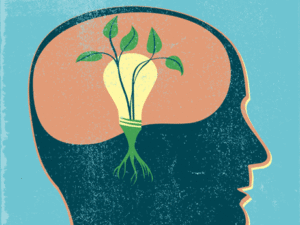 The good news is that a fixed mindset is not a life sentence. With awareness and deliberate effort, individuals can transition toward a growth mindset, embracing challenges, and unlocking their full potential.
The good news is that a fixed mindset is not a life sentence. With awareness and deliberate effort, individuals can transition toward a growth mindset, embracing challenges, and unlocking their full potential.
In the following sections, we’ll explore the transformative power of adopting a growth mindset. We’ll discover how it leads to resilience, a passion for learning, and a more positive outlook on life. By understanding the limitations of a fixed mindset, we open the door to personal growth and success.
The growth mindset represents a profound shift in perspective, where individuals believe that abilities and intelligence can be developed through effort, learning, and resilience. In this section, we’ll explore the attributes, benefits, and real-world examples of a growth mindset.
Characteristics of a Growth Mindset:
Embrace of Challenges: Individuals with a growth mindset welcome challenges as opportunities for growth and development. They see setbacks as stepping stones toward improvement.
View of Failure as Learning: Failure is not a source of shame but a valuable learning experience. A growth mindset encourages individuals to analyze failures, adapt, and persevere.
Passion for Learning: Those with a growth mindset have a natural enthusiasm for learning and acquiring new knowledge and skills. They understand that effort is a path to mastery.
Benefits of a Growth Mindset:
A growth mindset brings about a range of positive outcomes:
Resilience: Individuals with a growth mindset are resilient in the face of challenges, bouncing back from setbacks with determination.
Positive Outlook: They tend to have a more positive outlook on life, seeing opportunities even in difficult situations.
Continuous Improvement: The passion for learning drives continuous improvement, leading to personal and professional success.
Academic Success: A student with a growth mindset may actively seek out challenging courses, viewing them as opportunities to expand their knowledge.
Entrepreneurial Pursuits: Entrepreneurs with a growth mindset are more likely to persevere through the challenges of starting a business, viewing failures as steps toward eventual success.
The transition from a fixed mindset to a growth mindset is achievable:
Self-Awareness: Recognizing the presence of a fixed mindset is the first step. Awareness allows individuals to challenge their limiting beliefs.
Effort and Learning: Emphasize the value of effort and learning over immediate success. Encourage a willingness to make mistakes and learn from them.
Continuous Growth: Foster a culture of continuous growth and improvement, both personally and professionally.
As we explore further in this article, we’ll delve into the practical applications of a growth mindset in various aspects of life. We’ll discover how it can drive personal and professional success, resilience, and a more fulfilling life. By understanding and embracing the principles of a growth mindset, individuals can unlock their potential and achieve their goals.
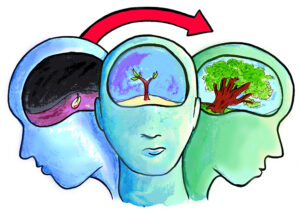
While mindset may sound like a philosophical concept, it has solid grounding in scientific research. In this section, we’ll explore the fascinating science behind mindset, including neuroplasticity and the brain’s adaptability.
At the heart of understanding mindset is the concept of neuroplasticity—the brain’s remarkable capacity to change and adapt in response to experiences, thoughts, and learning. This phenomenon challenges the notion that our abilities and intelligence are fixed from birth.
The Plastic Brain: Neuroplasticity reveals that our brains are highly adaptable, constantly forming new neural connections and pathways in response to learning and experiences.
Shaping Thought Patterns: Mindset plays a pivotal role in determining the thought patterns that activate and strengthen specific neural pathways. A growth mindset, for instance, encourages the brain to seek opportunities for learning and improvement.
Mindset influences neuroplasticity in profound ways:
Growth Mindset and Learning: A growth mindset aligns with the brain’s natural inclination for learning and adaptability. When individuals believe in their capacity to grow and improve, their brains are more receptive to new knowledge and skills.
Fixed Mindset and Limitations: Conversely, a fixed mindset can restrict the brain’s adaptability. Believing in fixed intelligence may limit the exploration of new concepts and skills.
Psychology and neuroscience research offer compelling evidence supporting the concept of mindset:
Impact on Behavior: Studies show that individuals with a growth mindset tend to engage in more effortful learning and are more likely to persist in the face of challenges.
Brain Structure Changes: Research indicates that the brain structure can change in response to mindset shifts. The adoption of a growth mindset can lead to the development of new neural pathways associated with learning and skill improvement.
Resilience and Stress Reduction: A growth mindset has been linked to increased resilience and reduced stress levels, demonstrating its profound impact on mental health.
While mindset may sound like a philosophical concept, it has solid grounding in scientific research. In this section, we’ll explore the fascinating science behind mindset, including neuroplasticity and the brain’s adaptability.
![]() Understanding the science behind mindset reinforces its practical importance in our lives. It emphasizes that mindset is not merely a philosophical concept but a tangible force that can shape our cognitive abilities, behaviors, and mental well-being.
Understanding the science behind mindset reinforces its practical importance in our lives. It emphasizes that mindset is not merely a philosophical concept but a tangible force that can shape our cognitive abilities, behaviors, and mental well-being.
As we progress through this article, we’ll continue to explore the practical applications of mindset, how it influences various aspects of life, and provide guidance on cultivating a growth-oriented mindset. By doing so, we empower ourselves to harness the science of mindset for personal growth and success.
Mindset extends its influence beyond cognitive patterns; it has a profound impact on our overall wellbeing. In this section, we’ll explore the connection between mindset and mental health, stress reduction, and overall life satisfaction.
A growth mindset contributes to improved mental health in several ways:
Reduced Anxiety: Embracing a growth mindset can reduce anxiety as individuals become more comfortable with the idea of making mistakes and facing challenges.
Increased Resilience: Those with a growth mindset are better equipped to bounce back from setbacks, contributing to overall emotional resilience.
Positive Self-Image: A growth mindset fosters a positive self-image, as individuals recognize their capacity for improvement and growth.
Stress is an inevitable part of life, but mindset influences how we perceive and respond to it:
Stress Reduction: Individuals with a growth mindset tend to view stress as a manageable challenge rather than an overwhelming burden.
Coping Mechanisms: A growth mindset encourages the development of healthy coping mechanisms, such as seeking support, problem-solving, and maintaining a sense of perspective.
Emotional Wellbeing: A growth mindset contributes to improved emotional wellbeing, reducing the negative impact of stress on mental health.
Mindset plays a significant role in shaping overall life satisfaction:
Fulfillment: A growth mindset promotes a sense of fulfillment as individuals actively pursue personal growth and development.
Positive Outlook: It encourages a positive outlook on life, leading to greater satisfaction in both personal and professional realms.
Relationships: A growth mindset can enhance relationships by fostering understanding, empathy, and effective communication.
Mindfulness Meditation: Mindfulness practices can help individuals become more aware of their thought patterns and emotions, enabling them to shift toward a growth mindset.
Positive Affirmations: Repeating positive affirmations can reinforce a growth-oriented perspective and boost self-confidence.
Seeking Support: Engaging in conversations with mentors, therapists, or supportive friends can provide valuable insights and encouragement.
In the upcoming sections, we’ll continue to explore the practical applications of mindset in various life domains. By understanding the impact of mindset on mental health and overall wellbeing, individuals can take proactive steps toward a more fulfilling and balanced life.

Understanding the concept of mindset is essential, but to harness its power, we must put it into practice. In this section, we’ll provide actionable steps and practical techniques for readers to assess and improve their mindset.
Self-Reflection: Engage in self-reflection to identify your current mindset tendencies. Do you lean more toward a fixed or growth mindset in different areas of life?
Identifying Limiting Beliefs: Identify specific limiting beliefs you may hold about your abilities, intelligence, or potential for growth.
Embrace Challenges: Embrace challenges as opportunities for learning and growth. Take on new challenges, even if they seem daunting.
Learn from Setbacks: Learn from setbacks and failures. Analyze past failures, extract lessons, and apply them to future endeavors.
Cultivate a Love for Learning: Inspire a passion for continuous learning through books, courses, or resources related to personal development and skill acquisition.
Mindful Self-Talk: Practice mindful self-talk by challenging negative or limiting beliefs with more growth-oriented affirmations.
Goal Setting: Set realistic yet challenging goals that align with your areas of interest and growth opportunities.
Journaling: Journal as a means of tracking personal growth, recording achievements, and reflecting on setbacks.
Surround Yourself with Positivity: Build a supportive network of friends, mentors, and colleagues who embrace a growth mindset.
Seek Feedback: Actively seek feedback from others and view it as a valuable source of growth.
Stay Resilient: Setbacks are part of the growth process. Remain resilient and persistent in the face of challenges.
Mindset is a powerful predictor of success in various aspects of life. In this section, we’ll explore how adopting a growth mindset can lead to personal and professional success, resilience, and the achievement of meaningful goals.
Resilience in the Face of Challenges: A growth mindset equips individuals with the resilience needed to persevere through setbacks and adversity.
Embracing Challenges: Those with a growth mindset are more likely to take on challenging tasks and see them as opportunities for growth.
Setting Ambitious Goals: A growth mindset encourages individuals to set ambitious and meaningful goals, as they believe in their capacity to achieve them.
Pursuit of Mastery: Individuals with a growth mindset are more likely to pursue mastery in their chosen fields, leading to expertise and recognition.
Adapting to Change: A growth mindset enables individuals to adapt to change and navigate uncertain circumstances effectively.
Learning from Failure: View failure as a valuable learning experience and a stepping stone toward success.
Effective Leadership: Leaders who embody a growth mindset tend to be more adaptable, open to feedback, and capable of inspiring and motivating their teams.
Organizational Success: Organizations that foster a growth mindset culture tend to be more innovative, agile, and successful in achieving their objectives.

The transformative power of a growth mindset: it can lead to success, resilience, and personal fulfillment.
I encourage readers to reflect on their own mindset and take steps to cultivate a growth-oriented perspective.
Ultimately, the path to unlocking one’s full potential begins with the belief in the power of mindset.
As we reach the conclusion of our exploration into the power of mindset, it’s essential to recap the key takeaways and emphasize the significance of mindset in shaping our lives.
Resilience: A growth mindset equips individuals with the resilience needed to bounce back from setbacks and face challenges with determination.
Continuous Improvement: A growth mindset fosters a passion for learning, leading to continuous improvement in all aspects of life.
Personal Growth: Actively cultivate a growth-oriented mindset in your personal and professional lives.
Success: Adopting a growth mindset can be a powerful predictor of success in various domains, from education to entrepreneurship.
As we conclude our journey into the transformative power of mindset, I invite you to take a significant step towards your personal growth and wellbeing by exploring the resources and tools offered by BrainTap.
BrainTap understands the profound impact of mindset on mental health, stress reduction, and overall life satisfaction.
We believe in your limitless potential to grow, adapt, and thrive. That’s why we offer a range of guided audio programs and tools designed to support your journey towards a growth-oriented mindset.
 Mindfulness and Meditation: Discover guided mindfulness and meditation sessions that can help you develop a growth mindset, reduce stress, and enhance your overall wellbeing.
Mindfulness and Meditation: Discover guided mindfulness and meditation sessions that can help you develop a growth mindset, reduce stress, and enhance your overall wellbeing.
Positive Affirmations: Access audio programs that reinforce positive affirmations, fostering a belief in your capacity for growth and success.
Resilience Training: Explore resilience-building programs that empower you to face challenges with courage and determination, just as a growth mindset encourages.
By embracing the power of mindset with BrainTap, you can actively cultivate a growth-oriented perspective that will propel you towards personal and professional success. Begin your journey today by exploring our extensive library of audio programs and resources designed to unlock your full potential.
Together, we can create a world where individuals embrace the power of mindset, leading to personal growth, resilience, and a more fulfilling life. Join us in this mindset revolution, and let’s embark on this transformative journey together.
Explore our library of audio programs and resources that can help you harness the power of mindset. Your journey towards personal growth and success begins here.
 Thank you for joining me on this exploration of mindset’s potential. I look forward to being a part of your journey toward a more empowered and fulfilling life.”
Thank you for joining me on this exploration of mindset’s potential. I look forward to being a part of your journey toward a more empowered and fulfilling life.”
Elevate your mind: Subscribe to our newsletter for insights on brain health, cutting-edge research updates, and personalized session suggestions to help you unleash your ultimate potential!


Customer Support
In order to streamline support requests and better serve you, we utilize a support ticket system. Every support request is assigned a unique ticket number. Please keep your support ticket number in a safe place and provide your number when contacting us.
Manufacturer’s Warranty
The BrainTap Headset Bluetooth model has a 12-month manufacturer’s warranty that covers any flaws or defects that the headset shipped with. Any sort of sustained physical damage is not covered under warranty. All other products or equipment come with a 30-day manufacturer’s warranty unless otherwise stated. Please reference your User Manual to view the complete warranty policy. Should you experience any difficulty with your equipment or accessories, we recommend first checking the troubleshooting guidelines in the User Manual included with the headset or reference our online Knowledge Base for headset tips and troubleshooting steps. If you are still having trouble and your headset is within the warranty period, call our Help Desk at 302-721-6677 or fill out an online support ticket for further assistance. If the item needs to be returned to BrainTap offices for assessment and replacement, you will be asked to provide proof of purchase and will be issued a Return Merchandise Authorization (RMA) number and shipping instructions. Items without proof of purchase will not be accepted for RMA.
Return Merchandise Authorization (RMA) Policy
A Return Merchandize Authorization (RMA) is a numbered authorization provided to permit the return of a product. Any product returned to BrainTap offices for testing, trade-in or refund must be accompanied by an RMA issued by our Help Desk. Please note that RMAs expire 15 days after issue. Returns postmarked after the expiration date will not be accepted. Please be sure to ship your return item promptly.
Out of Warranty Support Options
Should you experience any difficulty with your equipment or accessories, we recommend first checking the troubleshooting guidelines in the User Manual reference our online Knowledge Base for headset tips and troubleshooting steps. Even if your headset is outside of the warranty period, you can reach out to our Help Desk via phone at 302-721-6677 or online by filling out a support ticket for further help. If the product is determined to require replacement after troubleshooting, there is an option for an out of warranty trade-in and replacement for a fee. We do not offer repair services for out of warranty products.
Satisfaction Guarantee & Equipment Return Policy
There is a 45-day return policy on all products and packages purchased directly from BrainTap unless otherwise stated. BrainTap headsets purchased from a retail outlet or 3rd party must be returned to the place of purchase and are subject to the return policy of the seller. All returns must have proof of purchase and a Return Merchandise Authorization (RMA) number or the return will not be accepted. All products returns are subject to a 15% restocking fee. The return period begins on the day you received your order. To initiate the return process, reach out to our Help Desk via phone at 302-721-6677 or submit an online support ticket.
Shipping Fees
Shipping fees, if any, including duties and import taxes for international shipments, are non-refundable. In all instances, return shipping fees are the responsibility of the purchaser.
Membership Subscriptions
You may cancel your membership/program/subscription with a 30-day notice by logging into your account on BrainTap.com. Click the account icon at the top right of the page, then click the profile icon on the top right-hand side and then click Billing. Once you are on the Billing page you will be able to “Manage Subscriptions & Payment” where you can cancel your subscription.
All subscribers are required to provide a 30-day cancellation notice prior to terminating their subscription. This policy is implemented to ensure a smooth transition for both subscribers and the service provider, allowing for adequate time to process cancellation requests and manage subscription changes.
Calculation of 30-Day Notice Period: The 30-day cancellation notice period will be calculated from the next monthly payment due date following the receipt of the cancellation request. For example, if a subscriber submits a cancellation request on the 5th of the month and their next monthly payment is due on the 15th of the same month, the 30-day notice period will commence from the 15th of the month and extend until the 15th of the following month. Free trials are exempt from this 30-day notice policy and may be canceled at any time prior to the first payment due date without payment or penalty.
Refund Processing Time
It takes approximately 10 – 14 days to process a return. If you have any questions regarding your refund, refer / respond to your original support ticket or create a new support ticket and one of our customer support representatives will contact you.
Terms and Conditions of Use:
Last updated: January 30, 2024
This is an agreement between you and BrainTap, Inc. (with its affiliates, “BrainTap”, “we” or “us”) regarding the digital audio-recorded motivational programs and creative visualization sessions operated by BrainTap Technologies (the “Service”). Additionally, please read the site’s Privacy Policy.
By signing up for or using the Service, you agree to the following terms:
Your Account
If you do not have a BrainTap membership, you will need to establish an account with BrainTap.com to use the Service. Your payment methods on file with your BrainTap.com account will be used for your BrainTap account and the BrainTap Brain Fitness mobile application.
Membership/Programs/Subscription Plans
By subscribing to BrainTap’s mobile app, users are granted access to use the app on up to two devices. Each device is permitted up to five plays per day. The BrainTap Brain Fitness mobile app subscription is intended for personal use only. Commercial use in a business is strictly prohibited unless said business has an official Professional Partner License issued by BrainTap, Inc. BrainTap reserves the right to modify the subscription terms and limitations at any time without prior notice. Users are encouraged to review the terms periodically for any updates or changes. If you sign up for a membership/program/subscription plan, you agree to the terms, conditions and limitations associated with them that are posted on our websites or applications.
Promotional and Membership/Program/Subscription Content
We may make content available to you from time to time through the Service for which a purchase is not required. You will have access to this content only for so long as we make it available generally or, where it is provided as a benefit of a membership plan, for so long as you remain an active member of your plan in good standing. We may also remove this content from your account, devices and applications, or otherwise restrict your ability to access it.
Content Availability
We may add or remove purchasable, promotional and membership content (collectively, “Content”) from our catalog, membership plans and our Service at any time and make no guarantee as to the availability of specific Content in any membership plan or as to any minimum amount of Content in any membership plan. Some of our Content may be offered in limited territories or to limited membership levels. We may use geo-filtering technology to restrict access outside of those territories.
Fees and Renewal
Fees for purchased program content, membership plans, subscriptions, and other services will be stated at the time of your purchase or sign-up, as applicable, and provided in our help pages. The fees for membership plans may vary. Fees may be subject to tax and are non-refundable unless otherwise outlined herein. We only accept credit card and (most) debit cards for payment of membership fees. Please do not sign up for a program with a “check” or “ATM” card.
If your membership plan or subscription involves a recurring payment of a fee, unless you notify us 30 days before a charge that you want to cancel or do not want to automatically renew your membership or subscription, you understand it will automatically continue each month, and you authorize us (without notice to you, unless required by applicable law) to collect the then-applicable fees and any taxes using any credit card we have on record for you. All cancellations require a 30-day notice to allow time for processing.
If all credit cards we have on file for you are declined for payment of your membership or subscription fees, we may cancel your membership or subscription, as applicable, unless you provide us with a new credit card. If you provide us with a new credit card and are successfully charged before your membership or subscription is cancelled, your new membership or subscription period will be based on the original renewal date and not the date of the successful charge.
Membership/Program/Subscription Cancellation
You may cancel your membership/program/subscription with a 30-day notice by logging into your account on BrainTap.com. Click the account icon at the top right of the page, then click the profile icon on the top right-hand side and then click Billing. Once you are on the Billing page you will be able to “Manage Subscriptions & Payment” where you can cancel your subscription.
All subscribers are required to provide a 30-day cancellation notice prior to terminating their subscription. This policy is implemented to ensure a smooth transition for both subscribers and the service provider, allowing for adequate time to process cancellation requests and manage subscription changes.
Calculation of 30-Day Notice Period: The 30-day cancellation notice period will be calculated from the next monthly payment due date following the receipt of the cancellation request. For example, if a subscriber submits a cancellation request on the 5th of the month and their next monthly payment is due on the 15th of the same month, the 30-day notice period will commence from the 15th of the month and extend until the 15th of the following month. Free trials are exempt from this 30-day notice policy and may be canceled at any time prior to the first payment due date without payment or penalty.
Service Restrictions
We reserve the right to accept or refuse membership or to restrict use of the Service at our discretion. You may not transfer or assign your membership or any Service benefits. You may not use the Service for any commercial purposes without a written license to do so. If you would like to use any of the Services in a business setting, please contact us for information. We may take actions we deem reasonably necessary to prevent fraud and abuse, including placing restrictions on the amount of content or other services that can be accessed from the Service at any one time.
Content Restrictions
All content is protected by Federal copyright law. You may not (i) transfer, copy, share, or display Content, except as permitted in this Agreement; (ii) sell, rent, lease, distribute, or broadcast any Content; (iii) remove any proprietary notices or labels on Content; (iv) attempt to disable, bypass, modify, defeat, or otherwise circumvent any digital rights management or other protection system applied to Content or used as part of the Service; or (v) use the Service or Content for any commercial or illegal purpose.
Promotional Trial Memberships
We sometimes offer certain customers various trial or other promotional memberships, which are subject to the Terms except as otherwise stated in the promotional offers. We reserve the right, in our sole discretion, to determine your eligibility. Trial members may, at any time (through your “My Account”), choose not to continue paid memberships/subscriptions by cancelling prior to the end of the trial period. If a trial offer or a promotion requires you to have a valid payment instrument on file, such as a credit card or other permitted payment method, we may validate that payment method, including by requesting a temporary authorization from the financial institution issuing your payment instrument. If we determine that your payment instrument is invalid, without limiting any of our other rights, we may revoke any benefits, Credits or Content you may have received as part of the offer.
Agreement Changes
We may, at our discretion, change the Terms and all elements of them and any aspect of the Service without notice to you. If any change to the Terms is found invalid, void, or for any reason unenforceable, that change is sever-able and does not affect the validity and enforce-ability of any remaining changes and the remainder of the Terms. Your continued use of the Service after we change the Terms constitutes your acceptance of the changes. If you do not agree to any changes, you must not use the Service and must cancel your membership.
Termination by Us
Our business may change over time and we reserve the right to cancel the Service and any membership plan in whole or in part, and to terminate your membership and use of the Service at our discretion without notice. If we do so, we will give you a prorated refund based on the number of days remaining in your membership unless we terminate your membership for conduct that we determine, in our discretion, violates the Terms, violates any applicable law, involves fraud or misuse of the Service, or is harmful to our interests or another user. Our failure to insist upon or enforce your strict compliance with the Terms will not constitute a waiver of any of our rights.
Acceptance of terms of use and amendments
Each time you use or cause access to this website or any BrainTap application, you agree to be bound by these Terms of use, as amended from time to time with or without notice to you. In addition, if you are using a particular service on this website or accessed via this website, you will be subject to any rules or guidelines applicable to those services, and they will be incorporated by reference within these Terms of use. Additionally, please read the site’s Privacy policy and Warranty and Return policy if applicable.
The site editor’s service
This website and the services provided to you on and via this website are provided on an “AS IS” basis. You agree that the site editor reserves the right to modify or discontinue provision of this website and its services, and to remove the data you provide, either temporarily or permanently, at any time, without notice and without any liability towards you. The site editor will not be held responsible or liable for timeliness, removal of information, failure to store information, inaccuracy of information, or improper delivery of information.
Your responsibilities and registration obligations
In order to use this website, certain parts of it, or our mobile application, you may be required to register for a user account on this website; in this case, you agree to provide truthful information when requested, and — if a minimum age is required for eligibility for a user account — you undertake that you are at least the required age. By registering for a user account, you explicitly agree to this site’s Terms of use, including any amendments made by the site editor that are published herein.
Registration and password
You are responsible for maintaining the confidentiality of your password, and you will be responsible for all usage of your user account and/or user name, whether authorized or not authorized by you. You agree to immediately notify the site editor of any unauthorized use of your user account, username or password.
Your conduct
You agree that all information or data of any kind, whether text, software, code, music or sound, photographs or graphics, video or other materials (“content”), made available publicly or privately, will be under the sole responsibility of the person providing the said content, or of the person whose user account is used. You agree that this website may expose you to content that may be objectionable or offensive. The site editor will not be responsible to you in any way for content displayed on this website, nor for any error or omission.
By using this website or any service provided, you explicitly agree that:
(a) you will not provide any content or conduct yourself in any way that may be construed as: unlawful; illegal; threatening; harmful; abusive; harassing; stalking; tortuous; defamatory; libelous; vulgar; obscene; offensive; objectionable; pornographic; designed to interfere with or disrupt the operation of this website or any service provided; infected with a virus or other destructive or deleterious programming routine; giving rise to civil or criminal liability; or in violation of an applicable local, national or international law;
(b) you will not impersonate or misrepresent your association with any person or entity; you will not forge or otherwise seek to conceal or misrepresent the origin of any content provided by you;
(c) you will not collect or harvest any information about other users;
(d) you will not provide, and you will not use this website to provide, any content or service in any commercial manner, or in any manner that would involve junk mail, spam, chain letters, pyramid schemes, or any other form of unauthorized advertising or commerce; you will not use this website to promote or operate any service or content without the site editor’s prior written consent;
(e) you will not provide any content that may give rise to the site editor being held civilly or criminally liable, or that may be considered a violation of any local, national or international law, including — but not limited to — laws relating to copyrights, trademarks, patents, or trade secrets.
Submission of content on this website
By providing any content to this website:
(a) you agree to grant the site editor a worldwide, royalty-free, perpetual, non-exclusive right and license (including any moral rights or other necessary rights.) to use, display, reproduce, modify, adapt, publish, distribute, perform, promote, archive, translate, and to create derivative works and compilations, in whole or in part. Such license will apply with respect to any form, media, technology already known at the time of provision or developed subsequently;
(b) you warrant and represent that you have all legal, moral, and other rights that may be necessary to grant the site editor the license specified in this section;
(c) you acknowledge and agree that the site editor will have the right (but not obligation), at the site editor’s entire discretion, to refuse to publish, or to remove, or to block access to any content you provide, at any time and for any reason, with or without notice.
Third-party services
Goods and services of third parties may be advertised and/or may be made available on or through this website. Representations made regarding products and services provided by third parties will be governed by the policies and representations made by these third parties. The site editor will not in any manner be liable for or responsible for any of your dealings or interaction with third parties.
Indemnification
You agree to indemnify and hold harmless the site editor and the site editor’s representatives, subsidiaries, affiliates, related parties, officers, directors, employees, agents, independent contractors, advertisers, partners, and co-branders, from any claim or demand, including reasonable legal fees, that may be filed by any third party, arising out of your conduct or connection with this website or our services, including by not limited to services provided via our mobile application(s), your provision of content, your violation of these Terms of use, or any other violation by you of the rights of another person or party.
DISCLAIMER OF WARRANTIES
YOU UNDERSTAND AND AGREE THAT YOUR USE OF THIS WEBSITE AND OF ANY SERVICES OR CONTENT PROVIDED (THE “SERVICE”) IS AT YOUR OWN RISK. SERVICES AND CONTENT ARE PROVIDED TO YOU “AS IS”, AND THE SITE EDITOR EXPRESSLY DISCLAIMS ALL WARRANTIES OF ANY KIND, EITHER IMPLIED OR EXPRESS, INCLUDING BUT NOT LIMITED TO WARRANTIES OF MERCHANT-ABILITY, FITNESS FOR A PARTICULAR PURPOSE, AND NON-INFRINGEMENT.
THE SITE EDITOR MAKES NO WARRANTY, EITHER IMPLIED OR EXPRESS, THAT ANY PART OF THE SERVICE WILL BE UNINTERRUPTED, ERROR-FREE, VIRUS-FREE, TIMELY, SECURE, ACCURATE, RELIABLE, OR OF ANY QUALITY, NOR IS IT WARRANTED EITHER IMPLICITLY OR EXPRESSLY THAT ANY CONTENT IS SAFE IN ANY MANNER FOR DOWNLOAD. YOU UNDERSTAND AND AGREE THAT NEITHER THE SITE EDITOR NOR ANY PARTICIPANT IN THE SERVICE PROVIDES PROFESSIONAL ADVICE OF ANY KIND AND THAT ANY ADVICE OR ANY OTHER INFORMATION OBTAINED VIA THIS WEBSITE MAY BE USED SOLELY AT YOUR OWN RISK, AND THAT THE SITE EDITOR WILL NOT BE HELD LIABLE IN ANY WAY.
Some jurisdictions may not allow disclaimers of implied warranties, and certain statements in the above disclaimer may not apply to you as regards implied warranties; the other terms and conditions remain enforceable notwithstanding.
LIMITATION OF LIABILITY
YOU EXPRESSLY UNDERSTAND AND AGREE THAT THE SITE EDITOR WILL NOT BE LIABLE FOR ANY DIRECT, INDIRECT, SPECIAL, INCIDENTAL, CONSEQUENTIAL OR EXEMPLARY DAMAGES; THIS INCLUDES, BUT IS NOT LIMITED TO, DAMAGES FOR LOSS OF PROFITS, GOODWILL, USE, DATA OR OTHER INTANGIBLE LOSSES (EVEN IF THE SITE EDITOR HAS BEEN ADVISED OF THE POSSIBILITY OF SUCH DAMAGES), RESULTING FROM (I) THE USE OF SERVICES OR THE INABILITY TO USE SERVICES, (II) THE COST OF OBTAINING SUBSTITUTE GOODS AND/OR SERVICES RESULTING FROM ANY TRANSACTION ENTERED INTO ON THROUGH SERVICES, (III) UNAUTHORIZED ACCESS TO OR ALTERATION OF YOUR DATA TRANSMISSIONS, (IV) STATEMENTS BY ANY THIRD PARTY OR CONDUCT OF ANY THIRD PARTY USING SERVICES, OR (V) ANY OTHER MATTER RELATING TO SERVICES.
In some jurisdictions, it is not permitted to limit liability and, therefore, such limitations may not apply to you.
Reservation of rights
The site editor reserves all of the site editor’s rights, including but not limited to any and all copyrights, trademarks, patents, trade secrets, and any other proprietary right that the site editor may have in respect to this website, its content, and goods and services that may be provided. The use of the site editor’s rights and property requires the site editor’s prior written consent. By making services available to you, the site editor is not providing you with any implied or express licenses or rights, and you will have no rights to make any commercial use of this website or provided services without the site owner/editor’s prior written consent.
Notification of copyright infringement
If you believe that your property has been used in any way that could be considered a copyright infringement or a violation of your intellectual property rights, the site editor’s copyright agent may be contacted via:
e-mail to the site administrator
Applicable law
You agree that these Terms of use and any dispute arising out of your use of this website or products or services provided will be governed by and construed in accordance with local laws applicable at the site editor’s domicile, notwithstanding any differences between the said applicable legislation and legislation in force at your location. By registering for a user account on this website, or by using this website and the services it provides, you accept that jurisdiction is granted to the courts having jurisdiction over the site editor’s domicile, and that any disputes will be heard by the said courts.
Miscellaneous information
(i) In the event that any provision of these Terms of use is deemed to conflict with legislation by a court with jurisdiction over the parties, the said provision will be interpreted to reflect the original intentions of the parties in accordance with applicable law, and the remainder of these Terms of use will remain valid and applicable; (ii) The failure of either party to assert any right under these Terms of use will not be considered to be a waiver of that party’s right, and the said right will remain in full force and effect; (iii) You agree that any claim or cause in respect of this website or its services must be filed within one (1) year after such claim or cause arose, or the said claim or cause will be forever barred, without regard to any contrary legislation; (iv) The site editor may assign the site editor’s rights and obligations under these Terms of use; in this event, the site editor will be relieved of any further obligation.
We know that you care how your information is used, and we appreciate your trust that we will use it carefully and sensibly. This notice describes our privacy policy. By visiting us, you are accepting the privacy policy described below.
1. What Personal Information Do We Collect?
2. How Do We Use Your Information?
3. How Do We Protect the Security of Your Information?
4. Your Choice: Opt-in or Opt-out. It is your choice whether to receive emails or special offers from us or others. The following section provides you with this choice. Please note the default settings.
5. Children: We do not sell products or services to children. If you are under 18, you may use this site only with involvement of a parent or guardian.
6. Other Websites: Various Web sites may be linked to from this site. If you link to another site, your privacy depends on the policy of that site. We strongly urge you to check their privacy policy. Not all sites guarantee that they will not share your personally identifiable information with others. You may also wish to consult privacy guidelines such as those recommended by the Online Privacy Alliance (www.privacyalliance.org).
7. Contact Us: If you would like to learn more about our privacy policy, or to access your personally identifiable information contained on our website, you may contact us via the Contact Us page. You will be required to provide identifier information to assure that this information is not released to others. We reserve the right to modify this policy in the future. If we do so, notice will be posted on our home page.